|
|
|
Sort Order |
|
|
|
Items / Page
|
|
|
|
|
|
|
| Srl | Item |
| 1 |
ID:
110125


|
|
|
|
|
| Publication |
2012.
|
| Summary/Abstract |
Nearly four centuries of American history have witnessed the evolving conflict between two competing sets of values: a belief that acting on behalf of the common good should guide social and political behavior, and a belief that unfettered individual freedom should dominate political and social life. Tracing this conflict from Puritanism through the American Revolution, the Civil War, the rise of industrialism, the Progressive Era, the New Deal, the Great Society, and the conservative revival of the Nixon/Reagan era, the essay reveals this clash of values as pivotal to understanding the narrative of American history, with contemporary political battles crystallizing just how basic this conflict has been.
|
|
|
|
|
|
|
|
|
|
|
|
|
|
|
|
| 2 |
ID:
030273
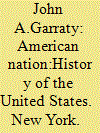

|
|
|
|
|
| Publication |
New York, Harper and Row, publishers, incorporated, 1966.
|
| Description |
920p.hbk
|
|
|
|
|
|
|
|
|
|
|
|
Copies: C:1/I:0,R:0,Q:0
Circulation
| Accession# | Call# | Current Location | Status | Policy | Location |
| 002140 | 973/GAR 002140 | Main | On Shelf | General | |
|
|
|
|
| 3 |
ID:
029365
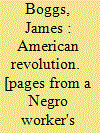

|
|
|
|
|
| Publication |
New York, Monthly Review Press, 1963.
|
| Description |
93p.pbk
|
|
|
|
|
|
|
|
|
|
|
|
Copies: C:1/I:0,R:0,Q:0
Circulation
| Accession# | Call# | Current Location | Status | Policy | Location |
| 012391 | 973.3/BOG 012391 | Main | On Shelf | General | |
|
|
|
|
| 4 |
ID:
081500
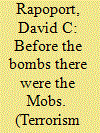

|
|
|
|
|
| Publication |
2008.
|
| Summary/Abstract |
Terrorist studies rarely discuss activities before the invention of dynamite, which made modern terror possible. One important, interesting, and forgotten form is the mob terror campaign. Two significant successful American examples are examined and compared, "The Sons of Liberty" which ignited the American Revolution, and the Ku Klux Klan, which "won the peace" the South wanted after it lost the Civil War. The study concludes by briefly comparing modern with mob terror
|
|
|
|
|
|
|
|
|
|
|
|
|
|
|
|
| 5 |
ID:
155885
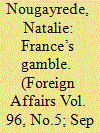

|
|
|
| 6 |
ID:
133077
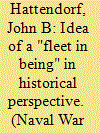

|
|
|
|
|
| Publication |
2014.
|
| Summary/Abstract |
The phrase "fleet in being" is one of those troublesome terms that naval historians and strategists have tended to use in a range of different meanings. The term first appeared in reference to the naval battle off Beachy Head in 1690, during the Nine Years' War, as part of an excuse that Admiral Arthur Herbert, first Earl of Torrington, used to explain his reluctance to engage the French fleet in that battle. A later commentator pointed out that the thinking of several British naval officers ninety years later during the War for American Independence, when the Royal Navy was in a similar situation of inferior strength, contributed an expansion to the fleet-in-being concept. To examine this subject carefully, it is necessary to look at two separate areas: first, the development of the idea of the fleet in being in naval strategic thought, and, second, the ideas that arose in the Royal Navy during the War of the American Revolution.
|
|
|
|
|
|
|
|
|
|
|
|
|
|
|
|
| 7 |
ID:
189985
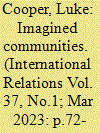

|
|
|
|
|
| Summary/Abstract |
Drawing on the concept of uneven and combined development this article critically interrogates Benedict Anderson’s theory of the ‘imagined community’ through an historical investigation into the English-realm-cum-British-empire. Placing its rise in the context of the conflicts of Post-Reformation Europe, it identifies vectors of combined development (money, goods, ideas, people) which shaped the formation of new imagined communities. These post-Reformation struggles were not defined by nationality but subjecthood, which saw ‘the realm’ displace the monarch as an object of rights and duties. The 18th century rise of British nationalism was a response to the long crisis of subjecthood (1639–1688). However, this emergence was uneven and non-linear, such that it co-existed as a political imagination with continued belief in – and political support for – subjecthood. Ironically, given its latter-day mythology, the American Revolutionary War was fought to protect subjecthood under the Crown from subordination to the British nation and its parliament.
|
|
|
|
|
|
|
|
|
|
|
|
|
|
|
|
| 8 |
ID:
023873
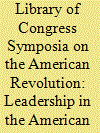

|
|
|
|
|
| Publication |
Washington, Libary of Congress, 1974.
|
| Description |
ix, 135p.hbk
|
| Standard Number |
0844401498
|
|
|
|
|
|
|
|
|
|
|
|
Copies: C:1/I:0,R:0,Q:0
Circulation
| Accession# | Call# | Current Location | Status | Policy | Location |
| 015926 | 973.3/LIB 015926 | Main | On Shelf | General | |
|
|
|
|
| 9 |
ID:
152908


|
|
|
|
|
| Summary/Abstract |
After 1660, writes historian Michael LaCombe, Englishmen depicted Native Americans as “tragic, hungry, and helpless victims.”1 A century later, Anglo-Irishman William Johnson, Superintendent of Indian Affairs, did otherwise. In describing the increased expense of Indian alliances in 1765 he complained, “All the Bull feasts ever given at Albany would not now draw down Ten Indians.”2 LaCombe’s English writers portrayed powerless, starving Indians, while Johnson worried about powerful ones uninterested in feasting. Historians must reconcile these contrasting portrayals. This article examines several ideas about Native hunger—that of the starving and useless mouth, that of the supplicant using hunger as a metaphor, and that of the warrior capable of doing without European provisions—which emerged over more than a century of Native and non-Native diplomacy. It contends that British misunderstandings of Iroquois (otherwise known as Six Nations, or Haudenosaunee) hunger during the American Revolution enabled Indians to use food diplomacy to retain power during a period that historians have characterized as disastrous for Natives.3 Indians accepted provisions and then refused to do what their allies wished, they explicitly ignored their hunger, and most significantly, they destroyed their allies’ food.
|
|
|
|
|
|
|
|
|
|
|
|
|
|
|
|
| 10 |
ID:
038684
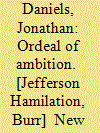

|
|
|
|
|
| Publication |
New York, Doubleday and company, Inc., 1970.
|
| Description |
446p.Hbk
|
|
|
|
|
|
|
|
|
|
|
|
Copies: C:1/I:0,R:0,Q:0
Circulation
| Accession# | Call# | Current Location | Status | Policy | Location |
| 015749 | 923.273/DAN 015749 | Main | On Shelf | General | |
|
|
|
|
| 11 |
ID:
123167
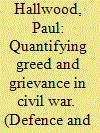

|
|
|
|
|
| Publication |
2013.
|
| Summary/Abstract |
Greed' vs. 'grievance' is weighed using a generally applicable methodology as motivations in the American War of Independence. Greed is quantified as the expected economic benefit of Independence - escaping colonial trade burdens and expected increased economic growth rates. Grievance is measured as willingness to pay to escape perceived political burdens. Quantification of the relative contributions is made possible by using estimates of expected war-costs. To the extent that the economic burden was insufficient to explain the War, the residual is ascribed to the grievance motivation. Both motives are shown to have contributed to the War, but grievance dominates.
|
|
|
|
|
|
|
|
|
|
|
|
|
|
|
|
| 12 |
ID:
147567
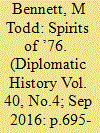

|
|
|
|
|
| Summary/Abstract |
An underappreciated bright spot in the otherwise bleak 1970s, the 200th anniversary of the American Revolution presented the United States with an opportunity to recapture some of the moral authority it squandered in Vietnam. The memory of the Revolution, not to mention the Declaration of Independence, remained alive and well in the world two centuries later, providing the United States with a durable source of prestige. U.S. public diplomats recalled the memory of 1776 in an effort to rebrand America in 1976. This article recalls that initiative, which speaks to the management of America's portrait in the global 1970s as well as the operability of commemorative diplomacy in international affairs.
|
|
|
|
|
|
|
|
|
|
|
|
|
|
|
|
| 13 |
ID:
153756
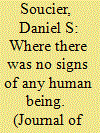

|
|
|
|
|
| Summary/Abstract |
Benedict Arnold’s expedition through the wilds of Maine in 1775 during the American Revolution is typically discussed in two common tropes: the praise for Arnold’s leadership and bravery to overcome insurmountable odds, and the privation and suffering experienced by the soldiers in the face of the howling wilderness. This article complicates this narrative by examining how soldiers examine, interact with, impose order over, and find pleasure in the natural world. It argues that all soldiers have complex ideas about the environments in which they serve and that quite often—despite intense privation—they feel fear, consternation, intrigue, invigoration, and awe.
|
|
|
|
|
|
|
|
|
|
|
|
|
|
|
|
| 14 |
ID:
030692
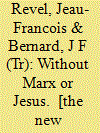

|
|
|
|
|
| Publication |
Bombay, Allied Publishers, 1972.
|
| Description |
xii, 269p.
|
|
|
|
|
|
|
|
|
|
|
|
Copies: C:1/I:0,R:0,Q:0
Circulation
| Accession# | Call# | Current Location | Status | Policy | Location |
| 010128 | 303.43/REV 010128 | Main | On Shelf | General | |
|
|
|
|
|
|
|
|
|